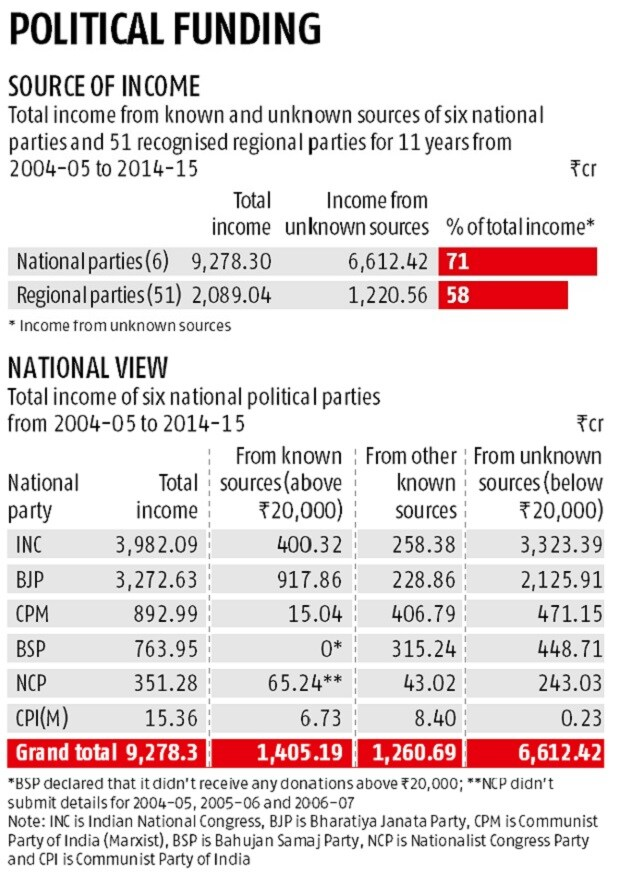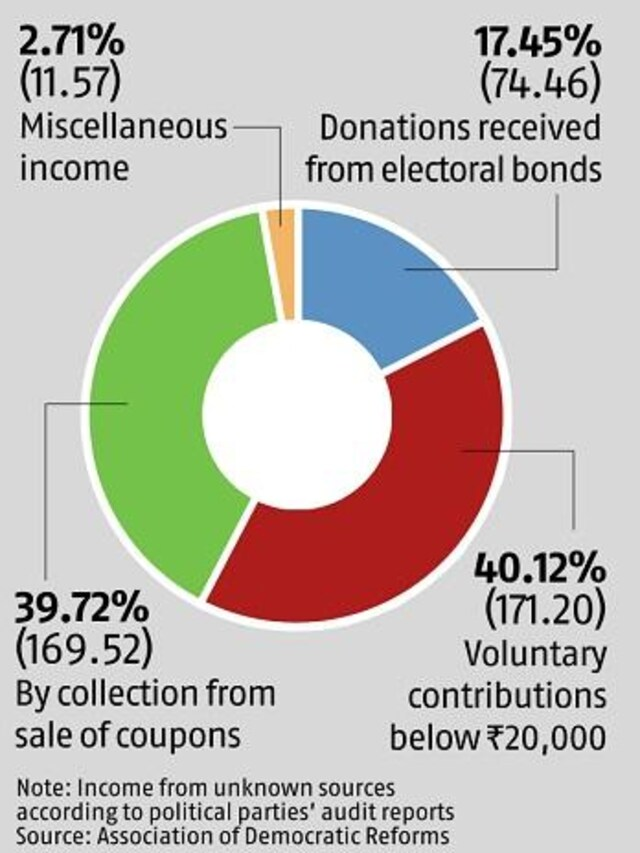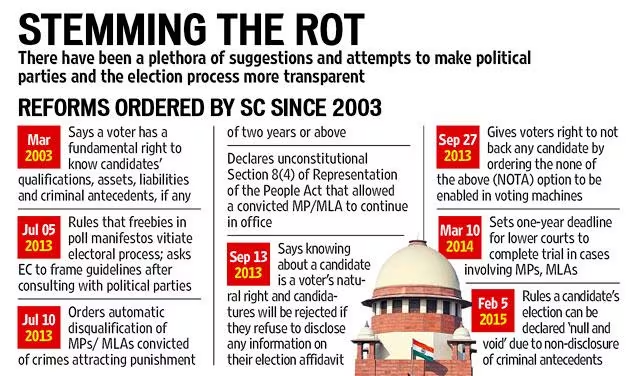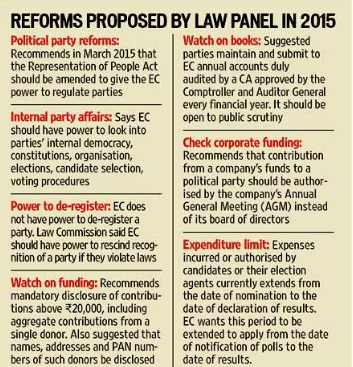Governance
State Funding Debate: A Path to Transparent Elections
- 18 Nov 2023
- 12 min read
This editorial is based on “Should elections be state funded?” which was published in The Hindu on 17/11/2023. It talks about the absence of transparency in election funding, examining the prospect of state funding as a potential solution to augment transparency in electoral processes.
For Prelims: State funding of elections, Chief Justice of India, Indrajit Gupta Committee, Law Commission of India, Second Administrative Reforms Commission, National Commission to Review the Working of the Constitution, Election Commission of India.
For Mains: About State Funding of Elections, Various Commissions about State Funding of Elections, Arguments in Favor of State Funding of Elections, Arguments Against State Funding of Elections, Way Forward.
A Constitution Bench led by the Chief Justice of India has recently concluded its hearings that challenge the legitimacy of the electoral bonds scheme. The discussions primarily revolved around the conflicting aspects of voters' right to information and the confidentiality of donors.
The central concern in these proceedings is the need for transparency in election funding. In this context, the reconsideration of the state or public funding of elections has emerged once again.
What is State Funding of Elections?
- About :
- State funding of elections refers to a system in which the government provides financial support to political parties and candidates to facilitate their participation in the electoral process.
- This funding is typically derived from public resources and aims to reduce the reliance on private donations, minimizing the potential influence of vested interests in political campaigns.
- Objective :
- The objective is to promote transparency, fairness, and equal opportunities for all participants in the electoral arena.
- Types of State Funding :
- Direct Funding: This involves the government providing direct monetary assistance to political parties and candidates to support their election campaigns
- Indirect Funding: Indirect funding encompasses subsidized or free media access, tax advantages, complimentary use of public spaces for campaign materials, and provisions for utilities, travel expenses, transport, and security, among others.
- Status of State Funding of Elections in India:
- Existing state funding measures comprise allocating free airtime on public broadcasters for national parties during general elections and for registered state parties in state legislature elections.
- National Parties receive certain benefits such as security, office space, and utility subsidies.
- Another form of indirect state funding in India is that registered political parties are exempted from paying income tax, as stipulated in Section 13A of the IT Act.
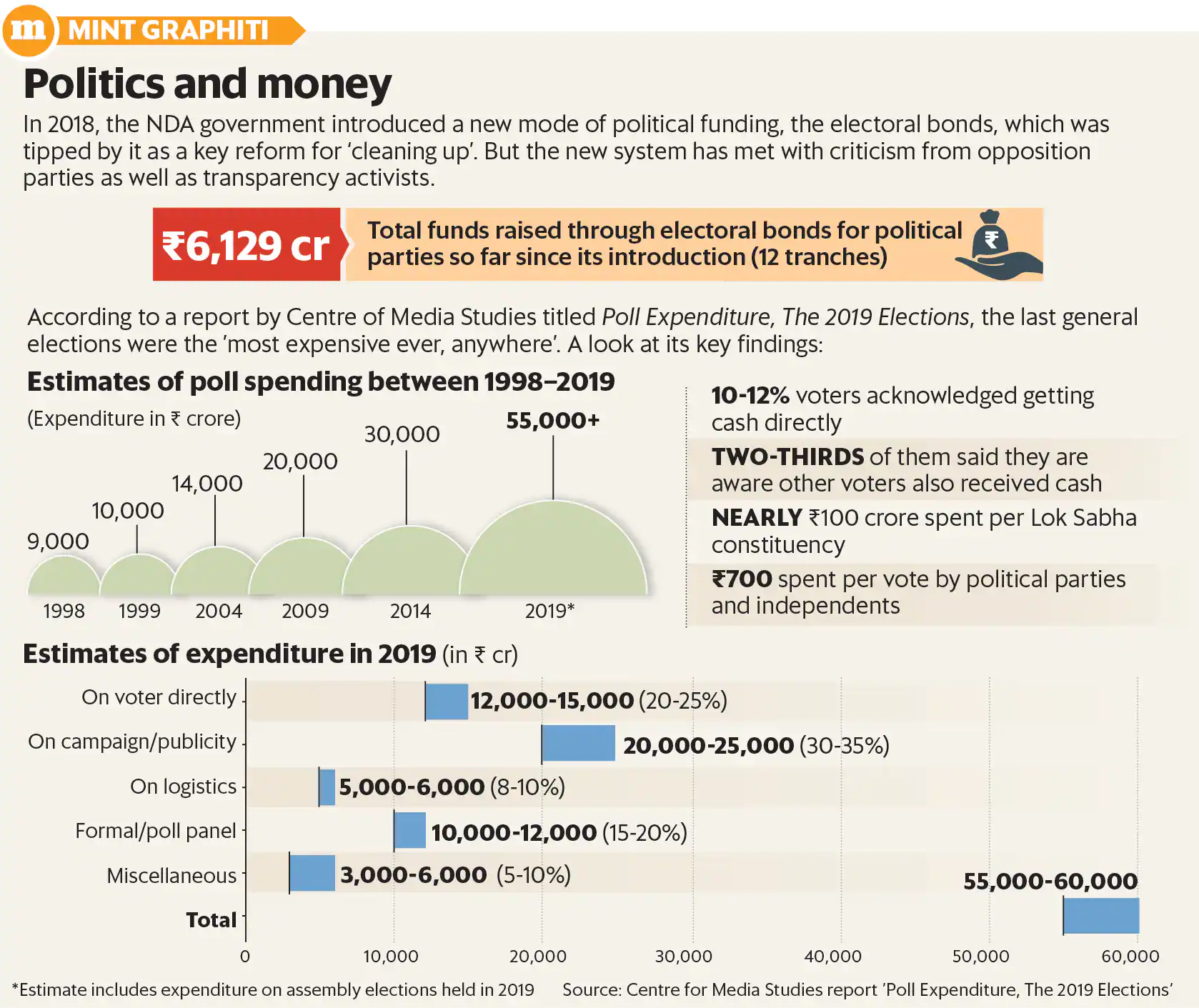
What have Various Commissions said about State Funding of Elections?
- Indrajit Gupta Committee (1998):
- Endorsed state funding of elections for constitutional, legal, and public interest reasons.
- Aimed to create a fair playing field, particularly for parties with limited financial resources.
- Law Commission of India (1999):
- Concluded that total state funding is desirable, provided political parties refrain from taking funds from other sources.
- Emphasized the need for a regulatory framework for political parties before attempting state funding.
- Second Administrative Reforms Commission (2008):
- Advocated partial state funding to curb "illegitimate and unnecessary funding" of election expenses.
- Addressed the issue of ethics in governance and recommended measures to reduce undue financial influence.
- National Commission to Review the Working of the Constitution (2001):
- Did not endorse state funding of elections.
- Agreed with the Law Commission report (1999) on the prerequisite of implementing a robust regulatory framework for political parties before considering state funding.
What are the Arguments in Favor of State Funding of Elections in India?
- Leveling the Playing Field:
- State funding aims to reduce the influence of money in politics, creating a more level playing field where political parties can compete based on ideas and policies rather than financial resources.
- State funding may encourage more individuals to participate in politics by removing financial barriers for potential candidates who may not have personal wealth or access to significant private funding.
- Reducing Corruption:
- By providing public funding, there is a potential to decrease the reliance on private donations, minimizing the scope for corrupt practices and reducing the influence of vested interests in politics.
- State funding can contribute to greater transparency in political financing, as public funds are subject to regulations and scrutiny, providing clearer insight into the financial aspects of political campaigns.
- Promoting Fair Competition
- State funding can foster fair competition by preventing certain parties or candidates from gaining undue advantages based solely on their financial resources.
- Reduced dependence on private donors may lead to greater independence for elected representatives, allowing them to focus on public interests rather than catering to the interests of major donors.
- Strengthening Political Parties:
- Public funding can contribute to the financial stability of political parties, allowing them to focus on long-term goals and policy development rather than short-term fundraising for each election cycle.
- State funding has the potential to address economic disparities among political parties, ensuring that smaller or emerging parties have a fair chance to participate in the democratic process.
What are the Arguments Against State Funding of Elections in India?
- The Burden on Taxpayers:
- Using public funds for elections places an additional burden on taxpayers, who may not want their money allocated to political activities.
- India has limited financial resources, and allocating funds for state-funded elections may divert resources from other essential public services.
- Potential for Misuse:
- Skeptics express concerns about the potential misuse of state funds, emphasizing the need for stringent regulations and accountability measures to prevent misuse or diversion of public resources.
- There are concerns that state funding could be manipulated for political advantage, with the ruling party having control over the allocation and distribution of funds, potentially influencing the electoral process.
- Risk of Dependency:
- The state funding may lead to political parties becoming overly dependent on public funds, potentially stifling financial independence and innovation in fundraising.
- Opponents contend that state funding may diminish the incentives for political parties to engage in grassroots fundraising and connect with their constituencies on a local level.
- Challenges in Implementation:
- Critics highlight the practical challenges in implementing state funding, such as determining eligibility criteria, distributing funds equitably, and establishing effective monitoring mechanisms.
- Some argue that state-funded initiatives may lack efficiency and accountability compared to private funding, as public institutions may not be as responsive or transparent.
What Should be the Way Forward?
- Comprehensive Legal Reforms:
- Enact and implement comprehensive legal reforms to regulate political party finances, election expenditures, and the sources of funding.
- This may include revisiting and strengthening existing laws or introducing new legislation to address loopholes.
- Encourage cross-party consensus on the need for electoral funding reforms
- Transparency in Political Party Funding:
- Mandate political parties to disclose all sources of funding, including details of donors and the amounts received.
- Ensure that this information is easily accessible to the public and regularly updated.
- Introduce an upper limit on the amount that can be donated to political parties to curb the influence of large corporate contributions.
- Independent Electoral Oversight:
- Strengthen the role of independent electoral oversight bodies, such as the Election Commission of India, to monitor and enforce compliance with campaign finance laws. Provide these bodies with adequate resources and autonomy.
- Auditing and Accountability:
- Establish a robust auditing mechanism to scrutinize the financial accounts of political parties. This includes conducting regular audits of their income, expenses, and compliance with legal provisions.
- Implement strong whistleblower protections to encourage individuals with knowledge of illicit funding practices to come forward without fear of retaliation.
- Leverage technology to enhance transparency in electoral funding. Explore blockchain or other secure digital platforms to record and disclose financial transactions, ensuring an immutable and accessible record.
- Learn from Best Practices:
- Study and adopt international best practices in campaign financing and electoral transparency.
- Establish a mechanism for regular review and adaptation of electoral funding regulations to address emerging challenges and ensure continued effectiveness.
- Conduct public awareness campaigns to educate citizens about the importance of transparent electoral funding.
Conclusion :
By embracing transparency in electoral funding in India, the nation can fortify the foundations of its democratic institutions and empower citizens with the knowledge and confidence that their electoral choices are influenced by ideas and values rather than the undue influence of financial interests.
|
Drishti Mains Question: Discuss the potential benefits and challenges associated with implementing state funding of elections in India. What policy measures do you suggest to create a more equitable and accountable electoral process in India? |
UPSC Civil Services Examination, Previous Year Question (PYQ)
Prelims:
Consider the following statements: (2017)
- The Election Commission of India is a five-member body.
- Union Ministry of Home Affairs decides the election schedule for the conduct of both general elections and bye-elections.
- The Election Commission resolves the disputes relating to splits/mergers of recognized political parties.
Which of the statements given above is/are correct?
(a) 1 and 2 only
(b) 2 only
(c) 2 and 3 only
(d) 3 only
Ans : D
Mains :
Q.In the light of recent controversy regarding the use of Electronic Voting Machines (EVM), what are the challenges before the Election Commission of India to ensure the trustworthiness of elections in India? (2018)

